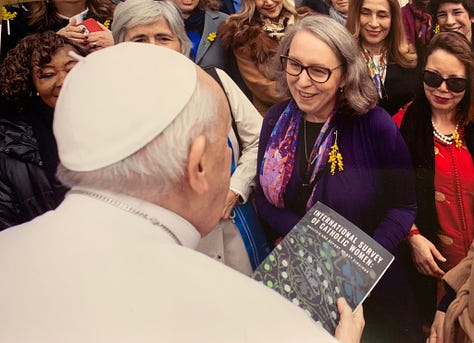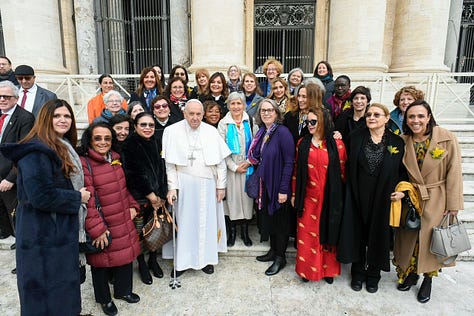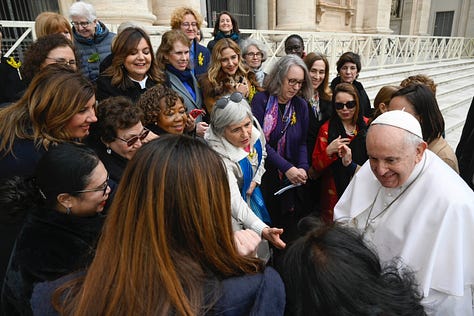
Discover more from "Listening to the Essence of Things": musings on life
I was asked to contribute a piece to the Polish Catholic magazine Kontakt on the occasion of the tenth anniversary of Pope Francis’s election. Other contributors include Jeannine Gramick, Thomas Doyle, Ivone Gebara, and Alexandre Masson. It’s exciting to be part of a project that offers Polish readers a chance to engage with feminist, liberationist, and LGBT theological perspectives. The articles are all available in Polish at the link above, with an option to use Google translate. I thought I’d publish my English version here, since online translations can be a bit clunky.



(The report is available to download at this link).
Pope Francis is restoring three essential dimensions to Catholic faith and life. First, he calls us to contemplative silence and sacramental worship, by way of which we seek the face of God through a biblically informed and mystical appreciation of the wonder of creation and our place within it. Second, he reminds us that the quest for social justice and care for the environment must find active expression in our lifestyles and relationships. Third, he emphasises the importance of inculturation, by way of which the God of history is incarnate in the devotions and pieties of popular religion.
There is however another essential dimension of faith that he has not yet tackled effectively, and that is the place of women in the Church. He has repeatedly acknowledged the need for women’s contribution to be more fully acknowledged, and he has called for greater participation of women at all levels of the institutional Church. In reality though, while he has appointed a few women to positions of leadership, these represent only a fraction of Catholic women’s different cultures and concerns. He often uses highly romanticised rhetoric about women’s gifts and attributes, but he shows little insight into the realities and challenges of women’s daily lives.
The synodal process that Pope Francis initiated is revealing that the role and representation of women is one of the most urgent challenges facing the Church. In 2022, the Catholic Women Speak network, which I coordinate, commissioned an International Survey of Catholic Women through a research team at the University of Newcastle in Australia, as a way of gathering feedback for the Synod. The survey was distributed in eight languages and more than 17,000 women responded, including 288 Polish responses. The results have been closely analysed and are now available online. They reflect the diversity of Catholic women around the world, but the majority of respondents support reform and have many shared concerns.
Polish women’s responses tended to be more conservative than those from more “progressive” Catholic cultures such as Germany, but even so, 85% of Polish respondents said they support reform, and 68% agreed that “radical reform is needed in the Catholic Church”. Only 8% agreed with the statement that “There is no need for any reform in the Catholic Church.” 59% agreed that “Women should be fully included at all levels of church leadership”, though there was less support for women’s ordination to the priesthood than in other countries. Even so, 38% of Polish respondents said they support women’s ordination. 70% agreed with the statement that “Women need to have freedom of conscience with regard to their reproductive decisions.” There was strong agreement (85%) that “Church leaders are not doing enough to address the perpetration and cover-up of sexual abuse”, and an even larger majority (92%) agreed that “Church leaders need to address other forms of abuse, including abuse of power and spiritual harm”.
The contrast between those who want radical change and those who are resistant to all change is reflected in two responses to open questions. A young Polish woman (aged 18 to 25) wrote that
Priests and Bishops … are poorly theologically and generally educated, bigoted, proud, greedy, and not in touch with the world. They tolerate, commit, or hide rapes on children and at the same time are fixated on sexuality and chastity. They attack LGBT people instead of helping those in need. … I do believe in God. I do want to be a part of the Church. … It has to change drastically.
Another older Polish woman (aged 41 to 55) felt very differently:
This synodal way is not what the Church needs. We need to be catechized in the traditional spirit and go back to embracing Jesus’s teaching without trying to update or change it to suit modern ways of life.
Pope Francis has made dialogue a central feature of his papacy, and it is clear that many of the reforms he seeks are those which find strong support among women. He has already achieved so much. His wisdom, compassion, and humour have made him a shining beacon of hope for many in a world lurching towards despair. I hope and pray that he sees how essential women are to the future of the Church. We are waiting to work with him as sisters and disciples in Christ.
Subscribe to "Listening to the Essence of Things": musings on life
Exploring questions of creation, desire, gender, and language, and sharing insights that are part of my "soul work" in doing research and reflecting on life.





A very fair and honest response to Pope Francis leadership and the appraisal of women’s voices. There is work to be done as well as gratitude for his leadership
In the '90s I visited Poland for two weeks. I witnessed some snippets of Catholicism there. One wedding Mass.... both very young people, both looking very unhappy. She was visibly pregnant. I reckon the sociocultural coercion to be traditionally "pious" is even stronger in Poland than in Ireland and Spain. I am not surprised that, in contrast to the demographics of other countries' survey results, it's especially younger women in Poland who cry for reform.